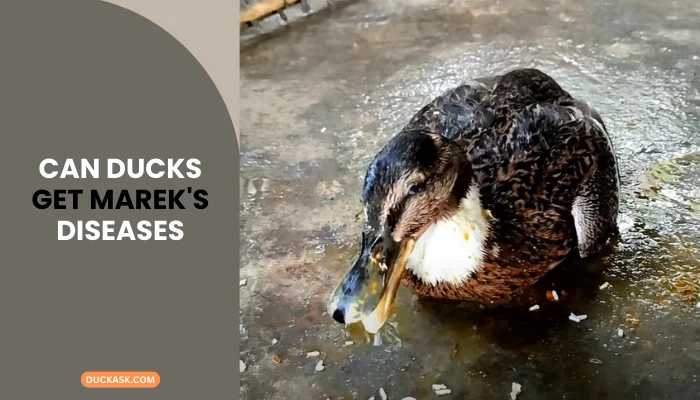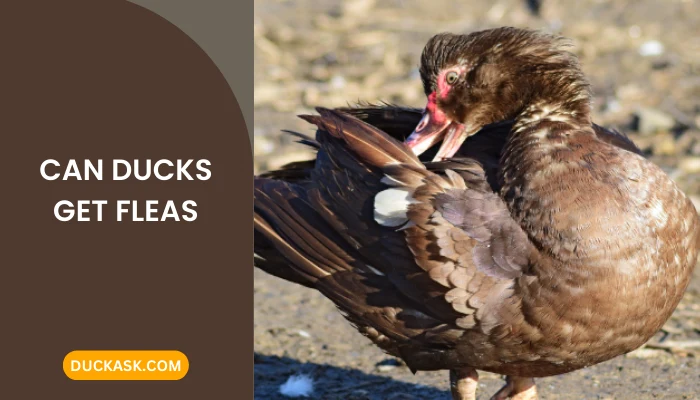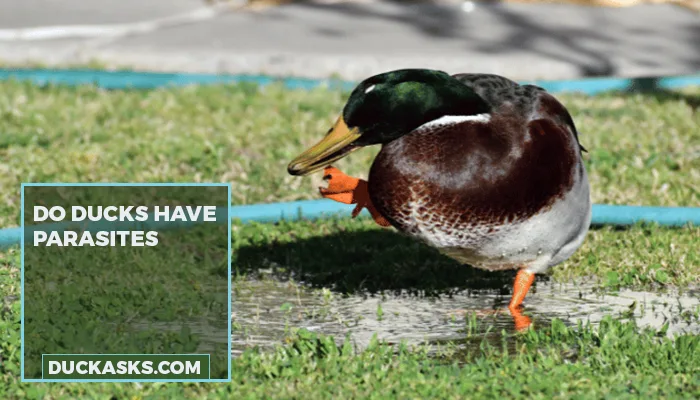Do Ducks Carry Diseases?
Ducks are able to fly great distances, and as they travel to a wide spread of regions, they are liable for bringing in many foreign infections and viruses along with them.
So naturally, a common concern is, do ducks carry diseases? Yes, although ducks do not get sick themselves, they can carry pathogens and diseases in their saliva, faces, and droppings. They are indeed very strong carriers of a pool of diseases.
As they travel across many different lands, they are able to introduce many new pathogens and foreign organisms into the locality. Let’s learn more about this fascinating and alarming topic below.
Looking for more articles about duck diseases:
What Diseases Do Ducks Spread?
Wild water birds are reservoirs for avian viruses. Some of the diseases that ducks carry are discussed below.
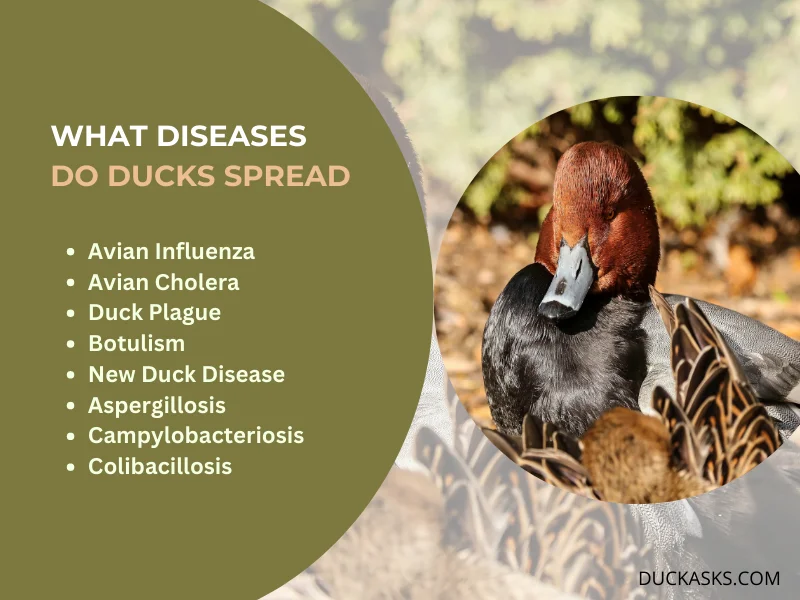
01. Avian Influenza
Ducks are natural hosts for various avian influenza viruses, including highly pathogenic strains like H5N1 and H7N0. These viruses can cause severe respiratory illness and have the potential to infect humans and other bird species.
Wild migratory ducks are more prone to carrying and spreading avian influenza over long distances during their annual migratory periods.
Infected ducks will have low coordination, diarrhea, sluggish behavior, and show signs of purple discoloration in body parts.
02. Avian Cholera
Also known as fowl cholera, it’s caused by the bacterium Pasteurella multocida. This disease is contagious but they primarily only affect domestic ducks in Asia.
Infected ducks can spread the disease by contaminating the collected water found in duck pens, food sources, and poor sanitation. Other birds may contract the disease if they come into contact with the contamination.
If infected with this virus, the ducks will become uninterested in food, they will have diarrhea, difficulty or wheezy breathing, and there will also be a noticeable mucous discharge from the mouth.
03. Duck Plague
Duck Plague, also known as duck enteritis, is caused by the duck plague virus (DPV), an acute, highly contagious, and often fatal disease that occurs almost exclusively in ducks and geese.
This disease affects older ducks more than younger ducks. The infected ducks will appear to be lazy, have untidy feathers, and may also have diarrhea that has a greenish-yellow color, sometimes also accompanied by a bit of blood.
04. Botulism
Ducks can carry botulism by ingesting toxins produced by the bacterium Clostridium botulinum.
This bacterium is commonly found in stagnant water bodies where there is some decaying organic matter like corpses and animal carcasses.
Botulism is extremely dangerous as it can cause paralysis and death within 48 hours. Furthermore, infected birds can become carriers of the disease and spread it to other animals.
05. New Duck Disease
New Duck Disease, also known as duck septicemia, is a bacterial infection that is caused by a bacteria called Riemerella anatipestifer.
The infection is extremely contagious and may spread very fast in the duck populace, particularly in captive ducks that are intensively raised. Many waterfowl carry this disease without showing any symptoms whatsoever.
Also, the symptoms may vary depending on the strain of the bacterium, the bird’s age, and overall state of immunity. If symptoms do appear, they will be common respiratory problems.
What’s more dangerous about this disease is that it can spread to humans who come into contact with contaminated food or water.
06. Aspergillosis
Aspergillosis is a fungal infection that can affect both domestic and wild ducks.
The infection occurs when ducks inhale fungal spores from contaminated food or environments such as moldy bedding straws. This infection develops to cause lung damage and inflammation.
Symptoms of the disease include open-mouth breathing, loss of appetite, severe weakness and water loss. As the disease progresses, it may cause significant respiratory distress and even death.
07. Campylobacteriosis
Campylobacteriosis is a bacterial disease caused by the Campylobacter spp genus, which is naturally and commonly found in the gastrointestinal tract of ducks and other birds.
This disease may spread to humans, causing problems such as diarrhea, abdominal pain and fever. To prevent the chances of campylobacteriosis infection, duck meat should be prepared and cooked properly.
08. Colibacillosis
Colibacillosis is a bacterial infection that is caused by the bacteria Escherichia coli (E. coli) bacteria that can affect ducks and other poultry species.
Ducks may become infected through contaminated water or feed. Symptoms of Colibacillosis include respiratory problems, frequent dehydration, and weakness in physical movement.
Do Ducks Carry Salmonella Like Chickens?
Salmonella is a group of bacteria that can cause foodborne illnesses in poultry including chicken and ducks, and also in humans.
Ducks can become carriers of Salmonella without exhibiting any signs of the disease themselves. Even duck eggs can carry the disease and spread it among humans.

Salmonella can spread from chickens and ducks to humans through direct contact, consumption of contaminated meat, or from improper handling during the preparations of duck products.
However, with proper maintenance of hygiene and health measures, humans can greatly reduce the chances of contracting Salmonella.
Proper cooking of duck meat and thorough washing of hands and surfaces after handling ducks or their eggs can help reduce the risk of Salmonella contamination and foodborne illnesses.
Additionally, practicing good risk management strategies in duck farms can prevent the introduction and spread of Salmonella among the duck population.
Can Dogs Get Parasites from Ducks?
Yes, dogs can get parasites from ducks. When dogs come into contact with infected ducks, they become susceptible to various diseases.
Ducks, like many other birds, can carry various parasites including internal and external parasites. Some internal parasites that ducks carry are in the form of worms like roundworms, tapeworms and flukes.

This sort of infection spreads to a dog if the dog ingests infected duck meat or comes into contact with contaminated food or water bodies.
On the other hand, external parasites like ticks and mites that ducks carry can also infect dogs. Two illnesses that most commonly spread to dogs from ducks are histoplasmosis and psittacosis.
Histoplasmosis
Histoplasmosis can spread from ducks to dogs through indirect exposure to fungal spores of Histoplasma capsulatum. This fungal disease affects the respiratory system and can be found in bird droppings, including those of ducks.
Some of the ways in which dogs can contract histoplasmosis are by the inhalation of spores, disturbed soil and by the ingestion of infected duck meat.
If a dog exhibits symptoms of coughing, breathing difficulties, weight loss, and lethargy after being exposed to ducks, then this is a serious concern that warrants an urgent visit to the vet.
Psittacosis
Another duck disease, psittacosis, is spread by chlamydia psittaci and can infect dogs through direct and indirect exposure to contaminated environments.
But the chances for contamination with chlamydia psittaci is really low because of the method of contraction.
The disease can spread if a dog inhales air containing dried-up particles of contaminated feces, as the bacterium will stick to the wet parts of the dog’s face and replicate.
However, if there is a contraction of the disease, then your dog will have swollen eyes that are red and watery with a yellowish discharge. They will also be low in energy and have increased itchiness.
Can Ducks Transmit Viruses to Humans?
The influenza virus, also known as bird flu, from ducks can indeed infect human beings.
Ducks shed the virus through their feces and mucus, which can be picked up by humans through direct contact with the infected birds or their contaminated excretions.
To prevent chances of disease transmission from poultry birds such as ducks, the Center of Disease Control and Prevention (CDC) emphasizes the importance of avoiding contact with dick or dead ducks, maintaining proper hygiene, and taking care to ensure a thorough and careful cooking.
Since most of us are consumers of poultry products, we have to take a closer look and get a clear idea of what diseases we might contract by consuming a meal of duck.
So, what disease can humans get from ducks? Well, some duck diseases that humans can contract from ducks are avian influenza (bird flu), psittacosis, salmonellosis, histoplasmosis, campylobacteriosis, and colibacillosis.
How Can I Prevent Contracting a Disease from a Duck?
The viruses they carry may infect other birds and animals, as well as human beings depending on certain factors like environment, type and level of exposure, etc.
To prevent infection from duck disease, try to avoid direct contact with all wild ducks. Also, stay away from domestic ducks, especially if they appear to be sick or lethargic.

If you are handling ducks, you should be very careful with your hygiene. Wear gloves when touching ducks and wash your hands with disinfectant soaps afterward.
Additionally, you have to cook duck meat very thoroughly as many diseases are spread by worms that may be present internally in the duck’s body and eggs.
Try to stay away from water that appears to be dirty or contaminated with duck droppings.
If you have a pet duck, try to keep your ducks very clean and provide them with controlled feed from a trustworthy source. And if your pet duck appears to be sick, do not neglect taking it to the vet.
Last but not least, you should be well-educated about the common maintenance tips for keeping ducks healthy and hygienic.
Are Ducks More Likely to Carry Diseases in Certain Regions?
Ducks are more likely to carry diseases in areas where there is a high population of other wildlife, birdlife and domestic poultry.
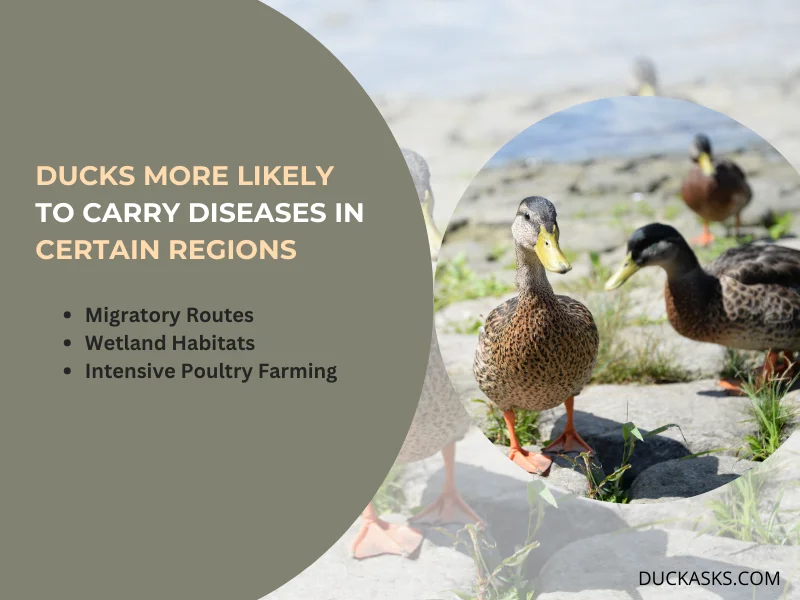
Since the prevalence of duck diseases depend on factors such as bird migration patterns, climate, population density and so on, some regions have a higher risk of disease transmission from ducks.
Migratory Routes
Ducks are migratory birds that travel long distances during their seasonal migrations.
Therefore, areas that are on their migratory route will get more visits from them in large capacities and thus be prone to give rise to a higher number of infections from ducks.
Wetland Habitats
Ducks prefer wetland habitats such as lakes, marshes, and ponds. Since these areas support a diverse set of bird populations, they are more likely to be contaminated with bird droppings that harbor disease-causing pathogens.
Intensive Poultry Farming
Regions with intensive poultry farming support higher proximity of ducks in large groups and thus are likely to be polluted with duck droppings, feces and other respiratory secretions that contain pathogens of duck diseases.
Conclusion
Yes, ducks, like many other birds, can be carriers of a variety of different diseases. Many ducks do not even show symptoms of the disease and coexist with humans and other animals spreading the disease.
If you, by any chance, come in contact with ducks, then be sure to wash your hands properly as quickly as you can. It’s the most effective way to save yourself from numerous diseases.
Take care to maintain a respectful distance when observing ducks and do not forget to maintain proper hygiene measures to reduce the chances of being infected by any diseases from ducks and continue to appreciate their beauty from a safe distance.
Reference Links:
- https://www.cdc.gov/flu/avianflu/index.htm
- https://www.vet.cornell.edu/animal-health-diagnostic-center/programs/duck-research-lab/health-care
- https://www.avma.org/resources-tools/animal-health-and-welfare/animal-health/avian-influenza/avian-influenza-companion-animals
- https://duckdvm.com/condition/salmonellosis
- https://wagwalking.com/bird/condition/campylobacter-infection
- https://www.ducks.org/conservation/waterfowl-research-science/understanding-waterfowl-ducks-and-disease
Image Credit:
- canva.com/photos

